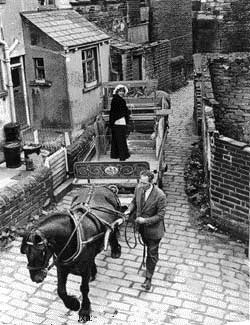|
Knowing that I shall soon leave my beloved Yorkshire to live in the desert of Arizona, I look at each of my childhood scenes hoping to press photographic images into my memory, from whose banks I will be able to conjure up in graphic detail when the lamp of my life shall burn low in the years not too distant and I remember days and places that were and are not.
Many of the giant mills are gone. Those that remain are turned to other uses than making worsted cloth whose quality has been seldom equalled and never surpassed. My memory rejoices not only by the images of these stone massives, but also from the recollection of the sound of their rumbling machinery complete with familiar thuds, and from the many smells, whose memories, whilst not pleasant, are vivid and welcome reminders of the place that was my home, in a time that is gone.  | Into these mills on many a dark wet morning went quiet people wrapped against the cold, inured to their misery, familiar with poverty and its attendant ills, but harbouring a secret cheerfulness that their circumstances should have denied them.
Children went to work in the mill, leaving fifty or sixty years later with broken and bent bodies, no savings, and no homes of their own. The factories broke their bodies whilst distorting and impoverishing their spirits.
After the steam whistle blew its last signal of the day, these morning mutes spilled themselves out onto the streets a little more erect than when they entered the confines of their place of imprisonment and labour in the dark morning hours.
Flowing from the strangely silent mills at home time gave workers pause to breathe clear air and leave the din of noisy machinery behind.
Grimy day had no claim on their souls when their hours of bondage ended, and they were freed until the morning hooter recalled their soulless bodies from warm blankets to a thraldom whose release came only with death.
Dinner was eaten at teatime, and passed with some sense of relief. Children were warned to be quiet while father ate, after which some time for them might be stolen from the evening's ration before bed called.
The stillness of outside nights was broken by occasionally raised voices from those who didn't know how to behave in public. Shouts of intemperate laughter echoed through empty thoroughfares, ran around courtyards, jiggled down muddy lanes, rattling off the walls of the tiny back-to-back terraced houses, while shared jokes, and quips giggled outside curtained closed windows, coming louder then softer as they faded into darkness, and the night closed in again on hushed and dim gas-lit streets.
No textile worker got rich. Mill owners and merchants drove Rolls-Royces as big as workers' houses, and lived in houses as large as their mills. They lived different lives and spoke a different language, unaware of the things their workers spoke about, for they were of another world and another culture that denied them insight into the misery of the miserly world of their employees.
Mill workers did without essentials as well as luxuries, because they could not afford interest on credit, yet could not afford to live without it, so debt and all its fears was ever present. They lived between the devil and the deep blue sea; between the mill and the stars, and few ever turned their eyes or minds outward or upward.
Nevertheless, after work, some listened to the radio, read newspapers, magazines and books, and broadened their horizons by attending evening classes at an educational institute. They discovered worlds outside of the circumscribed world that had been the lot of their kind for generations.
In the strange nights that come after long hours of hard labour, while some lost their pain through drink, these entered realms through an imagination that refused to accept the limits set upon it by others.
Intellectual rebellion was frowned upon. The smallest expression of self-improvement was condemned as disloyalty to one's family, community, and class.
Yet, as their minds rose to the stars and beyond, they wondered at what was beyond the world that held their bodies captive, with the consequence that their souls were liberated. They tasted a freedom that was little more than a dream. But it was these little dreams that opened the doors and eventually made liberation a reality.
We owe our opportunities to these courageous spirits, who in the belly of the dark, satanic mills, dared to dream when others said they could not and must not, and ignored the limitations of their world to let their minds bathe in the sunlight of other places and other times, even in the dark mill-tombs.
And it is these I shall miss most. The gritty men and women of the hard land of the North who, though their lives were moulded by the unyielding landscape and by the iron discipline imposed by their work, harboured powerful secret dreams that blazed avenues of escape for them and those who would follow.
These are my heroes. These, who held fast to their dreams in the face of hostility, who, in houses made of stone as hard as their own existence, played out their wretched lives and dared to dream their dreams, somewhere between the mill and the stars.
Copyright © 2000 Ronnie Bray
|


